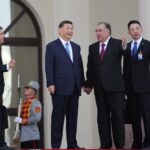John Kirby: ‘Careful’ talks with Germany led to sending tanks to Ukraine
NSC Coordinator for Strategic Communications John Kirby discusses whether the U.S. and Germany sending Abrams and Leopard 2 tanks to Ukraine could be a turning point in the war against Russia on ‘The Story.’
Germany and America are dear friends. Friends tell each other the truth. And the truth is that Germany is not pulling its weight against Russia.
During his recent visit to the United States, German Chancellor Olaf Scholz promised that his country would soon begin spending 2% of its annual budget on defense.
If this sounds familiar, it’s not déjà vu. It’s just one of many promises Germany made in the wake of Russia’s invasion of Ukraine that has yet to come to fruition.
By every measure, Germany—the economic leader of Europe—is failing to pull its weight. Its current spending by share of GDP wouldn’t even place Germany in the top 10 nations in terms of financial support for Ukraine.
Estonia, Latvia, Lithuania, and Poland have all provided more than double what Germany has given to Ukraine by share of GDP. But countries don’t need proximity to Russia to outspend Germany. The United Kingdom, Canada, and the United States have all outspent Germany in terms of GDP. In raw dollars, the United States has given sevenfold what Germany has sent to Ukraine.
In the same way it relied on Russia for energy, Germany is relying on everyone else to support Ukraine and keep Putin at bay.
Not only has Germany been slow to pull out its pocketbook, but it appears to be in no rush to send weapons, either. Germany delayed sending its Leopard 2 tanks to Ukraine for weeks while haggling with the Biden administration. Scholz would only agree to send the tanks if the United States first committed to sending its M1 Abrams.
Before moving an inch, Germany demands the United States move a mile. And so far, the Biden administration appears to be playing along.
Germany would be wise to consider where it was one year ago. As Putin’s men rapidly approached Kyiv, Germany’s military was in shambles.
Compared to where it was after the Cold War, the Bundeswehr—Germany’s armed forces—has one-third as many people today. Defense spending had plummeted to 1.3% of GDP compared to 3% at the close of the Cold War. Its tanks wouldn’t work. Its planes didn’t fly.
Chancellor Scholz called the moment a turning point for Germany. He promised to increase defense spending by 2% while also recruiting an additional 30,000 men and women to join the Bundeswehr by 2025. Later in the year, Germany also took leadership of the Atlantic Alliance’s Very High Readiness Joint Task Force.
But its defense spending has hardly peaked above 1.5 percent. Experts doubt it will reach the goal of recruiting 30,000. And the Very High Readiness Task Force still lacks the personnel or equipment to deploy within 72 hours. Germany showed some initiative with its purchase of 35 American F-35 fighter jets, but those aren’t set to take flight until 2027.
In his recent interview, Chancellor Scholz defended his spending failures by noting that energy—not defense—was its biggest concern when Russia invaded.
Germany had foolishly placed its energy security in Russia’s hands in the years leading up to the war in Ukraine. In theory, Germany buying natural gas from Russia was supposed to endear Putin to the west. In practice, all it did was make Germany dependent on Russia.
And when Russia started the war, it wasn’t Germany that turned away Russian energy; Russia flipped the switch and left Germany in the cold. Over the past year, Germany managed to diversify its energy partnerships, invested in LNG terminals to expand its gas reserves, and improved its nuclear energy capacity.
But Germany didn’t learn its lesson. In the same way it relied on Russia for energy, Germany is relying on everyone else to support Ukraine and keep Putin at bay.
What you do is what you believe, and everything else is just cottage cheese.
It’s time for our friends in Germany to deliver on their promises to Ukraine and start footing the bill for their own defense. With a full year of war already gone, Germany must start acting like the European leader it claims to be.
Source: FOX News















